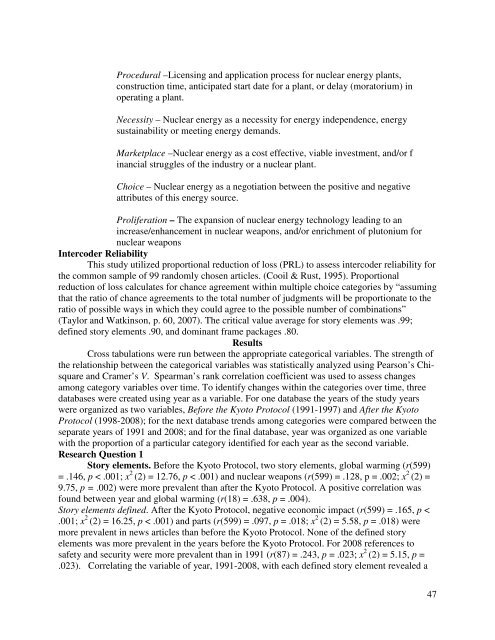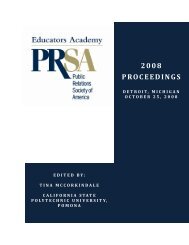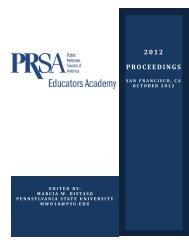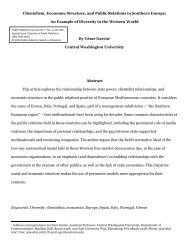2010 - Public Relations Society of America
2010 - Public Relations Society of America
2010 - Public Relations Society of America
You also want an ePaper? Increase the reach of your titles
YUMPU automatically turns print PDFs into web optimized ePapers that Google loves.
Procedural –Licensing and application process for nuclear energy plants,<br />
construction time, anticipated start date for a plant, or delay (moratorium) in<br />
operating a plant.<br />
Necessity – Nuclear energy as a necessity for energy independence, energy<br />
sustainability or meeting energy demands.<br />
Marketplace –Nuclear energy as a cost effective, viable investment, and/or f<br />
inancial struggles <strong>of</strong> the industry or a nuclear plant.<br />
Choice – Nuclear energy as a negotiation between the positive and negative<br />
attributes <strong>of</strong> this energy source.<br />
Proliferation – The expansion <strong>of</strong> nuclear energy technology leading to an<br />
increase/enhancement in nuclear weapons, and/or enrichment <strong>of</strong> plutonium for<br />
nuclear weapons<br />
Intercoder Reliability<br />
This study utilized proportional reduction <strong>of</strong> loss (PRL) to assess intercoder reliability for<br />
the common sample <strong>of</strong> 99 randomly chosen articles. (Cooil & Rust, 1995). Proportional<br />
reduction <strong>of</strong> loss calculates for chance agreement within multiple choice categories by “assuming<br />
that the ratio <strong>of</strong> chance agreements to the total number <strong>of</strong> judgments will be proportionate to the<br />
ratio <strong>of</strong> possible ways in which they could agree to the possible number <strong>of</strong> combinations”<br />
(Taylor and Watkinson, p. 60, 2007). The critical value average for story elements was .99;<br />
defined story elements .90, and dominant frame packages .80.<br />
Results<br />
Cross tabulations were run between the appropriate categorical variables. The strength <strong>of</strong><br />
the relationship between the categorical variables was statistically analyzed using Pearson’s Chisquare<br />
and Cramer’s V. Spearman’s rank correlation coefficient was used to assess changes<br />
among category variables over time. To identify changes within the categories over time, three<br />
databases were created using year as a variable. For one database the years <strong>of</strong> the study years<br />
were organized as two variables, Before the Kyoto Protocol (1991-1997) and After the Kyoto<br />
Protocol (1998-2008); for the next database trends among categories were compared between the<br />
separate years <strong>of</strong> 1991 and 2008; and for the final database, year was organized as one variable<br />
with the proportion <strong>of</strong> a particular category identified for each year as the second variable.<br />
Research Question 1<br />
Story elements. Before the Kyoto Protocol, two story elements, global warming (r(599)<br />
= .146, p < .001; x 2 (2) = 12.76, p < .001) and nuclear weapons (r(599) = .128, p = .002; x 2 (2) =<br />
9.75, p = .002) were more prevalent than after the Kyoto Protocol. A positive correlation was<br />
found between year and global warming (r(18) = .638, p = .004).<br />
Story elements defined. After the Kyoto Protocol, negative economic impact (r(599) = .165, p <<br />
.001; x 2 (2) = 16.25, p < .001) and parts (r(599) = .097, p = .018; x 2 (2) = 5.58, p = .018) were<br />
more prevalent in news articles than before the Kyoto Protocol. None <strong>of</strong> the defined story<br />
elements was more prevalent in the years before the Kyoto Protocol. For 2008 references to<br />
safety and security were more prevalent than in 1991 (r(87) = .243, p = .023; x 2 (2) = 5.15, p =<br />
.023). Correlating the variable <strong>of</strong> year, 1991-2008, with each defined story element revealed a<br />
47
















